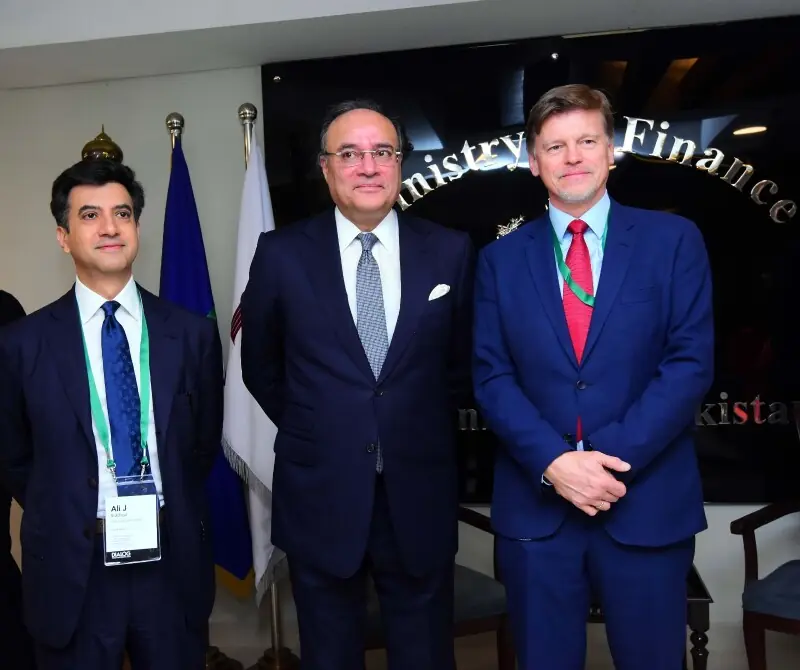Finance Minister Muhammad Aurangzeb on Tuesday hosted a high-level delegation from Dialog, the global leadership platform founded by Peter Thiel and Auren Hoffman, at the Finance Division.
Led by Ambassador Ali Jehangir Siddiqui, the delegation included prominent international figures from government, technology, and business sectors such as Simon Stevens (Member, UK House of Lords), Veit Valentin Dengler (Member of Parliament, Austria and Founder Draw.Solutions), Yasmin Green (CEO, Jigsaw Google), Fatima Kardar (VP, Xbox-Microsoft), Shadi Martini (CEO, MultiFaith Alliance), Evan Marwell (CEO, EducationSuperHighway), and Himanshu Gulati (Member of Parliament, Norway) amongst others, read a statement.
Peter Thiel is a billionaire entrepreneur and venture capitalist, famous for co-founding PayPal and Palantir Technologies. Auren Hoffman is an American entrepreneur, author, and CEO of SafeGraph, a company that gathers location data from mobile devices. Together, they co-founded Dialog, an invite-only organization for high-profile leaders
The meeting focused on Pakistan’s economic reforms, investment potential, and ongoing efforts to strengthen macroeconomic stability and private-sector-led growth.
Welcoming the delegation, the finance minister expressed appreciation for Dialog’s continued engagement with Pakistan since the inaugural Dialog Pakistan-Winter 2024, which has helped broaden international understanding of Pakistan’s economic landscape and investment potential.
During the meeting, Aurangzeb outlined Pakistan’s macroeconomic consolidation over the past 18 months, noting recent upgrades by Fitch, S&P and Moody’s affiliates, as well as the successful Second Review of Pakistan’s IMF Extended Fund Facility and the Climate Resilience Program.
He highlighted improving geopolitical alignment, strengthening relationships with the United States, China, and Saudi Arabia, and the launch of CPEC Phase 2.0, focused on business-to-business investment, export-oriented industrial zones, and joint ventures.
Aurangzeb stressed the government’s focus on structural reforms, including taxation, energy sector restructuring, privatisation of state-owned enterprises, governance reforms, and federal expenditure rationalisation.
The minister also explained Pakistan’s progress on pension reforms, transition to contributory schemes for new entrants, and upcoming measures to address long-term fiscal liabilities.
On energy reforms, the finance minister discussed governance improvements in distribution companies, loss-reduction efforts, private-sector representation on boards, and a renewed privatisation pipeline. He reaffirmed the government’s commitment to a competitive tariff regime, the sustainability of the power sector, and greater private-sector participation.
During the question-and-answer session, Aurangzeb responded to queries on Pakistan’s tariff discussions with the United States, debt trajectory, banking regulation, and the link between infrastructure investments under CPEC and long-term growth.
“He emphasised the government’s intention to re-enter international capital markets next year, including potential issuance of Panda bonds and steps to deepen domestic financial markets,” read the statement.
The finance minister noted that Pakistan’s demographic advantage, coupled with ongoing reforms in mining, agriculture, IT, AI, digital infrastructure, pharmaceuticals, and manufacturing, positions the country for sustained, private-sector-led growth.


